Text
Understanding CSF Rhinorrhea: Causes, Symptoms, and Treatment

Cerebrospinal fluid (CSF) plays a crucial role in protecting the brain and spinal cord, acting as a cushion against injury and providing essential nutrients. However, when CSF leaks out of the nasal passages, a condition known as CSF rhinorrhea occurs, posing potential risks to health and requiring prompt medical attention. In this article, we delve into the causes, symptoms, and treatment options for CSF rhinorrhea.
What is CSF Rhinorrhea?
CSF rhinorrhea refers to the leakage of cerebrospinal fluid from the skull base into the nasal passages. This leakage can result from a tear or hole in the membranes surrounding the brain and spinal cord, typically caused by trauma, such as a head injury or surgery. In some cases, CSF rhinorrhea can also occur spontaneously without any apparent cause.
Causes of CSF Rhinorrhea:
Trauma: Head injuries, particularly those involving fractures to the skull base, can disrupt the integrity of the membranes that contain CSF, leading to leakage.
Surgery: Certain surgical procedures, such as those involving the sinuses or skull base, can inadvertently cause damage to the membranes, resulting in CSF rhinorrhea.
Congenital Abnormalities: Rarely, individuals may be born with defects in the skull base or the membranes surrounding the brain, predisposing them to CSF leakage.
Idiopathic: In some cases, the exact cause of CSF rhinorrhea remains unknown, and it may occur spontaneously without any preceding trauma or surgery.
Symptoms of CSF Rhinorrhea:
The hallmark symptom of CSF rhinorrhea is the persistent discharge of clear fluid from one or both nostrils. This fluid may increase with changes in position, such as bending forward, coughing, or straining. Other symptoms may include:
Headaches, particularly when lying down
Stiff neck
Sensation of fluid trickling down the throat
Recurrent or severe sinus infections
Taste of saltiness in the back of the throat
It is essential to differentiate CSF rhinorrhea from other causes of nasal discharge, such as allergies or viral infections. Unlike CSF, nasal secretions from these conditions are typically cloudy or colored.
Diagnosis and Treatment:
Diagnosing CSF rhinorrhea often involves a combination of medical history, physical examination, and diagnostic tests. Imaging studies, such as MRI or CT scans, can help identify the site and extent of CSF leakage. In some cases, a specialized test called beta-2 transferrin analysis may be performed on the nasal fluid to confirm the presence of CSF.
Once diagnosed, treatment aims to repair the site of CSF leakage and prevent future episodes. Depending on the cause and severity of the condition, treatment options may include:
Conservative Management: In cases of mild CSF rhinorrhea, conservative measures such as bed rest, elevation of the head, and avoidance of activities that increase intracranial pressure may be sufficient.
Surgical Repair: For persistent or recurrent CSF rhinorrhea treatment, surgical intervention may be necessary to repair the site of leakage. This may involve endoscopic techniques or open surgical procedures, depending on the location and extent of the defect.
CSF Shunting: In rare cases where surgical repair is not feasible or unsuccessful, a CSF shunt may be implanted to divert the flow of CSF away from the nasal passages.
Conclusion:
CSF rhinorrhea is a potentially serious condition that requires prompt medical evaluation and treatment. While it can occur due to various causes, timely diagnosis and appropriate management can help prevent complications and improve outcomes for affected individuals. If you experience persistent nasal discharge or other symptoms suggestive of CSF rhinorrhea, it is crucial to consult a healthcare professional for further evaluation and management.
#csf rhinorrhea#cerebrospinal fluid#csf rhinorrhea diagnosis#csf rhinorrhea symptoms#CSF rhinorrhea treatment in Delhi
0 notes
Text
Understanding CSF Rhinorrhea: Symptoms, Diagnosis, and Treatment in India

Introduction to CSF Rhinorrhea
Our brain and spinal cord are surrounded by a protective fluid called cerebrospinal fluid, which acts as a cushion. Sometimes, due to injury or other factors, this fluid can leak out of the skull and flow through the nose, a condition known as CSF rhinorrhea.
Causes of CSF Rhinorrhea
The most common known cause of CSF rhinorrhea is head trauma. It can also occur after certain surgeries or due to conditions like a tumor.
Recognizing CSF Rhinorrhea Symptoms
How do you know if you might have CSF rhinorrhea? One significant sign is clear, watery fluid dripping from the nose. Unlike regular nasal discharge, this fluid is usually tasteless and non-sticky, which are key CSF rhinorrhea symptoms to be aware of.
The Importance of Prompt Medical Attention
If you suspect CSF rhinorrhea, it is crucial to seek medical attention promptly. The leak exposes the brain to potential infections which can be serious and even life-threatening, making CSF leak treatment a priority.
CSF Rhinorrhea Diagnosis Process
Diagnosis often involves imaging like a CT scan or MRI to locate the source of the leak, which are essential steps in CSF rhinorrhea diagnosis.
Treatment Options for CSF Rhinorrhea
Treatment varies depending on the severity and cause. Minor cases might heal on their own, whereas larger leaks may require surgical intervention either by an open approach or an endoscopic approach. The surgeon may use tissue grafts, synthetic materials, or a combination of both to seal the breach and reinforce the protective barrier. Advances in medical technology have made these procedures, crucial aspects of CSF rhinorrhea treatment in Delhi, increasingly successful and less risky.
Conclusion: The Significance of Addressing CSF Rhinorrhea
In summary, CSF rhinorrhea is like a leak in the barrier between the brain and nose, allowing brain fluid to escape through the nose. Prompt diagnosis and treatment significantly improve outcomes for individuals with CSF rhinorrhea. Ignoring the symptoms or delaying medical attention may increase the risk of complications.
#CSF rhinorrhea treatment in Delhi#leaking cerebrospinal fluid#csf rhinorrhea treatment#csf rhinorrhea surgical treatment
0 notes
Text
Understanding Acute Ear Infections and Ear Discharge: Causes, Symptoms, and Treatment
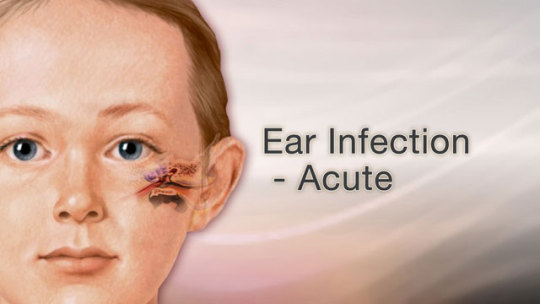
Ear infections are a common ailment affecting individuals of all ages, characterized by pain, discomfort, and in some cases, ear discharge. These infections can be caused by various factors, ranging from bacterial or viral infections to environmental triggers. Understanding the causes, symptoms, and treatment options for acute ear infections and ear discharge is essential for effective management and prevention of complications.
The best pediatric ENT specialist and ENT surgeon in Delhi is a crucial step in ensuring the well-being of your child's ear, nose, and throat health. It's essential to choose professionals with the right qualifications, experience, and a child-friendly approach. By doing your research, seeking recommendations, and consulting with potential specialists and surgeons, you can make an informed decision that prioritizes your child's health and comfort.
Common causes of acute ear infections and ear discharge include:
Bacterial Infections: Bacteria such as Streptococcus pneumonia, hemophilic influenza, and Moraxella catarrhal is are often responsible for causing ear infections, particularly in children.
Viral Infections: Viruses such as the common cold or flu can also lead to ear infections by causing inflammation and fluid buildup in the middle ear.
Allergies: Allergic reactions to environmental allergens, such as pollen or dust mites, can trigger inflammation in the Eustachian tube, leading to fluid accumulation and increased susceptibility to ear infections.
Anatomical Factors: Anatomical abnormalities, such as a cleft palate or dysfunction of the Eustachian tube, can impair proper drainage of fluid from the middle ear, increasing the risk of infection.
Symptoms of Acute Ear Infections and Ear Discharge: The symptoms of acute ear infections and ear discharge can vary depending on the severity of the infection and the individual's age. Common symptoms include:
Ear Pain: Sharp or dull pain in the affected ear, which may worsen when lying down or chewing.
Ear Discharge: Yellow or white fluid draining from the ear, indicating the presence of pus or fluid buildup in the middle ear.
Fever: A low-grade fever may accompany acute ear infections, especially in children.
Hearing Loss: Temporary hearing loss or muffled hearing due to fluid accumulation in the middle ear.
Irritability: Infants and young children may become fussy or irritable due to ear pain and discomfort's
Treatment Options for Acute Ear Infections and Ear Discharge: Treatment for acute ear infections and ear discharge often depends on the underlying cause and severity of the infection. Common treatment options include:
Antibiotics: If the infection is bacterial in nature, a course of antibiotics may be prescribed to eliminate the bacteria and reduce inflammation.
Pain Management: Over-the-counter pain relievers such as ibuprofen or acetaminophen can help alleviate ear pain and discomfort.
Ear Drops: Prescription or over-the-counter ear drops containing antibiotics or corticosteroids may be recommended to reduce inflammation and pain.
Warm Compress: Applying a warm compress to the affected ear can help relieve pain and promote drainage of fluid from the middle ear.
Observation: In some cases, particularly for mild infections, a healthcare provider may recommend a "wait-and-see" approach, monitoring symptoms for improvement without immediate intervention.
Prevention of Acute Ear Infections and Ear Discharge: While it may not always be possible to prevent acute ear infections entirely, there are several measures individuals can take to reduce their risk:
Maintain Good Hygiene: Practice good hand hygiene, especially during cold and flu seasons, to reduce the spread of viruses and bacteria.
Avoid Smoking: Exposure to secondhand smoke can increase the risk of ear infections, so it's essential to avoid smoking and limit exposure to smoke.
Vaccination: Stay up-to-date on vaccinations, including the pneumococcal vaccine and flu shot, to reduce the risk of infections that can lead to ear infections.
Manage Allergies: If you have allergies, work with your healthcare provider to manage symptoms effectively and reduce inflammation in the Eustachian tube.
Avoid Ear Trauma: Be cautious when inserting objects into the ear canal, as this can cause injury and increase the risk of infection.Conclusion:
Finding a reliable ear specialist in Delhi is crucial for anyone experiencing ear-related issues or seeking routine check-ups for ear health. In a city as vast as Delhi, there are numerous qualified ear specialists, also known as otolaryngologists or ENT (ear, nose, and throat) doctors acute ear infections and ear discharge can cause significant discomfort and inconvenience, but with prompt diagnosis and appropriate treatment, most cases can be managed effectively. By understanding the causes, symptoms, and treatment options for these conditions, individuals can take proactive steps to reduce their risk and promote ear health. If you or your child experience symptoms of an ear infection or ear discharge, it's essential to seek medical attention for proper evaluation and management.
0 notes
Text
Understanding Deafness in Children: Causes, Impact, and Support

Deafness in children is a multifaceted condition that can have a profound impact on their overall development. The challenges associated with hearing impairment can affect various aspects of a child's life, including language acquisition, social interactions, and academic performance. This article aims to explore the causes of deafness in children, its consequences, and the importance of early intervention and support.
Causes of Deafness in Children:
Deafness in children can be congenital (present at birth) or acquired later in life. Congenital deafness may be attributed to genetic factors, prenatal exposure to infections like rubella, or complications during birth. On the other hand, acquired deafness can result from illnesses, infections, or exposure to loud noises.
Genetic factors play a significant role in congenital deafness, with a variety of genetic mutations linked to hearing impairment. Advances in genetic testing have allowed for early identification of such mutations, enabling parents and healthcare providers to take proactive measures in managing and supporting children with congenital deafness.
Cochlear implants Availability in Delhi:
Delhi, as a hub of medical excellence, boasts several healthcare institutions and clinics offering cochlear implant services. Renowned hospitals equipped with state-of-the-art facilities and experienced medical professionals have been at the forefront of providing cochlear implant surgeries and follow-up care.
Several factors contribute to the availability of cochlear implants in Delhi, including the city's reputation as a medical tourism destination, the presence of skilled otolaryngologists and audiologists, and collaborations with international cochlear implant manufacturers.
Impact on Development:
Deafness in children can significantly impact their language development. Language acquisition in early childhood is closely linked to hearing, and children with hearing impairment may face challenges in learning spoken language. This can affect their ability to communicate effectively, potentially leading to delays in social and emotional development.
Academic performance may also be affected, as many educational settings rely heavily on verbal communication. Deaf children may face challenges in keeping up with their hearing peers, necessitating tailored educational strategies and accommodations. It's crucial to recognize that each child's experience with deafness is unique, and their needs may vary.
Early Intervention and Support:
Early intervention plays a pivotal role in mitigating the impact of deafness on a child's development. The sooner hearing loss is identified, the earlier appropriate interventions can be implemented. Newborn hearing screening programs have become a standard practice in many countries, allowing for the early identification of hearing impairment.
Technology has played a crucial role in supporting children with hearing impairment. Hearing aids and cochlear implants are examples of assistive devices that can significantly improve a child's ability to hear and communicate. Specialized educational programs, such as those incorporating sign language or other visual communication methods, are also essential in providing tailored support.
Supportive environments that foster inclusivity and understanding are crucial for the overall well-being of children with deafness. Parents, educators, and healthcare professionals must work collaboratively to create an environment that addresses the unique needs of each child.
Conclusion:
Deafness in children presents unique challenges, but with early identification, intervention, and support, children with hearing impairment can thrive and reach their full potential. The integration of technological advancements, educational strategies, and a supportive community can make a significant difference in the lives of these children. It is essential for society to recognize and appreciate the diversity of abilities in children, fostering an inclusive environment that allows every child to flourish.
#cochlear implants in delhi#cochlear implant surgeon in delhi#ent specialist in south delhi#ear specialist in delhi
0 notes
Text
The Role of Sleep Apnea Clinics in Diagnosis and Treatment
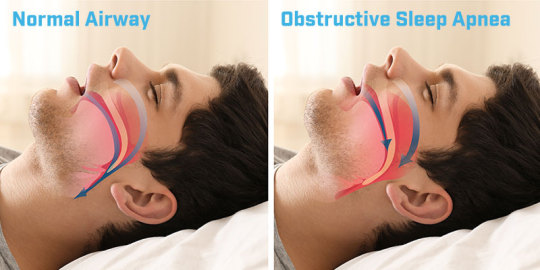
Sleep apnea is a common sleep disorder characterized by pauses in breathing or shallow breaths during sleep. Left untreated, it can lead to serious health issues such as cardiovascular problems, daytime fatigue, and impaired cognitive function. Recognizing the importance of addressing sleep apnea, specialized facilities known as sleep apnea clinics play a crucial role in diagnosing and treating this condition.
Diagnosis at Sleep Apnea Clinics: Sleep apnea clinics are equipped with state-of-the-art diagnostic tools and facilities to assess patients' sleep patterns and identify potential sleep apnea. One of the primary diagnostic methods employed is polysomnography, a comprehensive sleep study that monitors various physiological parameters during sleep. This includes monitoring brain activity, eye movement, heart rate, respiratory effort, air flow, and blood oxygen levels.
The process typically involves an overnight stay at the clinic, where patients are carefully monitored by sleep technologists. The collected data is then analyzed by sleep specialists to determine the presence and severity of sleep apnea. These clinics also consider patients' medical history, symptoms, and lifestyle factors to formulate an accurate diagnosis.
Treatment Options: Upon confirming a diagnosis of sleep apnea, sleep apnea clinics play a pivotal role in developing personalized treatment plans for patients. The severity of sleep apnea may vary among individuals, and treatment options range from lifestyle modifications to medical interventions.
Lifestyle Modifications: Sleep apnea clinics often advocate for lifestyle changes as a primary approach to managing mild cases of sleep apnea. This may include weight loss, positional therapy (changing sleeping positions), and avoiding alcohol and sedatives before bedtime.
Continuous Positive Airway Pressure (CPAP) Therapy: For moderate to severe cases, the most common and effective treatment is CPAP therapy. Sleep apnea clinics provide guidance on the use of CPAP machines, which deliver a constant stream of air to keep the airways open during sleep.
Bi-level Positive Airway Pressure (BiPAP) Therapy: In some cases, patients may benefit from BiPAP therapy, which provides different pressure levels for inhalation and exhalation, offering more comfort and support.
Oral Appliances: Sleep apnea clinics may also recommend oral appliances, such as mandibular advancement devices, which help reposition the jaw and tongue to keep the airway open.Follow-up and Monitoring: Sleep apnea clinics play a crucial role in the ongoing care and monitoring of patients. Regular follow-up appointments are scheduled to assess treatment effectiveness, make necessary adjustments to therapy, and address any concerns or challenges patients may be facing.
Conclusion: Sleep apnea clinics are integral in the comprehensive management of sleep apnea, from accurate diagnosis to personalized treatment plans. By combining advanced diagnostic tools with a multidisciplinary approach, these clinics contribute significantly to improving the quality of life for individuals suffering from sleep apnea. If you suspect you may have sleep apnea or are experiencing symptoms such as loud snoring, choking, or gasping during sleep, seeking the expertise of a sleep apnea clinic is a crucial step towards better health and restful sleep.
0 notes
Text
Enhancing Sleep Quality: Consult with a Sleep Specialist in Delhi or an ENT Doctor in Vasant Vihar

Quality sleep is essential for overall health and well-being, and individuals experiencing sleep-related issues often seek the expertise of sleep specialists or ENT doctors. In Delhi, the capital city of India, individuals have access to a range of healthcare professionals, including sleep specialists and ENT doctors in specific neighborhoods like Vasant Vihar. This article explores the significance of consulting with a sleep specialist in Delhi and an ENT doctor in Vasant Vihar to address sleep-related concerns.
Understanding Sleep Disorders:
Sleep disorders can significantly impact one's daily life, affecting productivity, mood, and overall health. Common sleep disorders include insomnia, sleep apnea, restless legs syndrome, and narcolepsy. While some issues may be related to respiratory or ENT concerns, others may require the expertise of a sleep specialist in Delhi who can diagnose and treat a broad spectrum of sleep-related conditions.
The Role of Sleep Specialists in Delhi:
Delhi boasts a vibrant healthcare landscape, and individuals seeking help for sleep-related issues can benefit from consulting with specialized sleep doctors. Sleep specialists in Delhi are medical professionals with expertise in diagnosing and treating various sleep disorders. These specialists often conduct comprehensive sleep studies, including poly Polysomnography, to identify the root causes of sleep disturbances.
ENT Doctors in Vasant Vihar:
For individuals whose sleep issues may be linked to ear, nose, or throat conditions, consulting and ENT doctor is a prudent choice. Vasant Vihar, a prominent neighborhood in Delhi, is home to reputable ENT specialists who can assess and treat a wide range of ENT-related issues. These professionals are equipped to address concerns such as snoring, sinusitis, and other respiratory conditions that may contribute to sleep disturbances.
Collaboration between Sleep Specialists and ENT Doctors:
In some cases, sleep disturbances may have both sleep-related and ENT components. Collaborative efforts between sleep specialists and ENT doctors can provide a holistic approach to diagnosis and treatment. By working together, these specialists can offer comprehensive care, ensuring that all aspects of a patient's sleep health are addressed.
Patient-Centric Approach:
Whether consulting a sleep specialist in Delhi or an ENT doctor in Vasant Vihar, patients can expect a patient-centric approach to care. Healthcare professionals in these areas prioritize understanding the unique sleep patterns and medical histories of their patients. This approach allows for tailored treatment plans that may include lifestyle modifications, medical interventions, or surgical procedures, depending on the nature of the sleep disorder.
Conclusion:
Recognizing the importance of quality sleep and seeking professional help for sleep-related concerns is a crucial step towards overall well-being. In Delhi, individuals have the advantage of consulting with dedicated sleep specialists and experienced ENT doctors in Vasant Vihar. By taking a proactive approach and seeking expert advice, individuals can address sleep issues effectively and work towards achieving restful, rejuvenating sleep for improved health and vitality.
0 notes
Text
Finding the Best Pediatric ENT Specialist and ENT Surgeon in Delhi
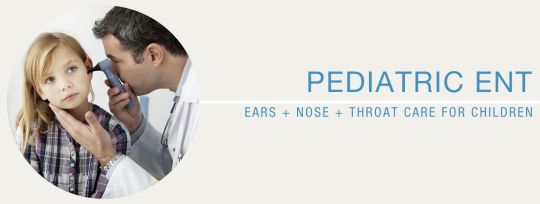
When it comes to your child's health, you want nothing but the best, especially when it comes to specialized medical care. In Delhi, the field of pediatric Ear, Nose, and Throat (ENT) care is well-established, with a plethora of talented specialists and surgeons to choose from. This article will guide you in finding the best pediatric ENT specialist and ENT surgeon in Delhi, highlighting the importance of their expertise in addressing children's ENT issues.
The Importance of Pediatric ENT Specialists
Pediatric ENT specialists are medical professionals who specialize in diagnosing and treating disorders of the ear, nose, and throat in children. These specialists are crucial as they understand the unique needs and challenges associated with pediatric patients. Here's why finding the best pediatric ENT specialist in Delhi is essential:
Expertise: Pediatric ENT specialists have in-depth knowledge and expertise in diagnosing and treating a wide range of ENT issues that specifically affect children. They can effectively address common concerns like ear infections, tonsillitis, speech and swallowing problems, and congenital abnormalities.
Child-Friendly Approach: A pediatric ENT specialist in Delhi is trained to provide a child-friendly and comforting environment during consultations and treatments. This approach can help alleviate a child's anxiety and make the experience less stressful for both the child and the parents.
Customized Care: Children's anatomy and physiology differ from adults, and pediatric ENT specialists are equipped to provide customized care that addresses these differences. They understand the unique challenges of treating smaller structures and ensure that treatments are tailored to the child's specific needs.
The Role of ENT Surgeons in Delhi
ENT surgeons, on the other hand, are medical professionals who specialize in surgical interventions to treat various conditions of the ear, nose, and throat. While some ENT surgeons may have a broad range of experience, it's essential to find the best ENT surgeon in Delhi for your child's specific needs. Here's why choosing the right ENT surgeon is vital:
Subspecialty Expertise: Just as with pediatric ENT specialists, ENT surgeons often have subspecialty expertise. They may focus on pediatric ENT surgery, ensuring that they are highly skilled in performing procedures that specifically address children's ENT issues.
Surgical Precision: When surgery is required, precision and skill are of utmost importance. The best ENT surgeon in Delhi will have a wealth of experience and a track record of successful procedures, ensuring that your child receives the best care possible.
Safety and Post-Operative Care: A skilled ENT surgeon also prioritizes the safety of your child during surgery and provides comprehensive post-operative care to ensure a smooth recovery. They work closely with the pediatric ENT specialist to ensure a seamless continuum of care.
How to Find the Best Pediatric ENT Specialist and ENT Surgeon in Delhi
Research: Start by researching pediatric ENT specialists and ENT surgeons in Delhi. You can use online resources, medical directories, or seek recommendations from your child's pediatrician or trusted friends and family.
Qualifications and Experience: Check the qualifications and experience of the specialists and surgeons you shortlist. Look for board certification, experience with pediatric patients, and a history of successful treatments.
Reviews and Testimonials: Reading patient reviews and testimonials can provide valuable insights into the doctor's reputation and patient satisfaction.
Consultation: Schedule consultations with the specialists and surgeons to discuss your child's condition and treatment options. This is an excellent opportunity to assess their approach, communication skills, and compatibility with your child.
Conclusion
Finding the best pediatric ENT specialist and ENT surgeon in Delhi is a crucial step in ensuring the well-being of your child's ear, nose, and throat health. It's essential to choose professionals with the right qualifications, experience, and a child-friendly approach. By doing your research, seeking recommendations, and consulting with potential specialists and surgeons, you can make an informed decision that prioritizes your child's health and comfort.
#best ent specialist in delhi#best ent doctor in delhi#snoring specialist delhi#best cochlear implant surgeon in delhi
0 notes
Text
Finding Relief: The Best Allergy Treatment in Vasant Vihar and Delhi

Allergies can be a constant source of discomfort and distress, affecting millions of people worldwide. In a bustling city like Delhi, where environmental factors can exacerbate allergies, finding the right treatment is essential. Vasant Vihar, a posh locality in Delhi, is home to several healthcare facilities that offer top-notch allergy treatment. In this article, we will explore the best allergy treatment in Vasant Vihar and Delhi to help you breathe easy and enjoy life to the fullest.
Understanding Allergies
Before delving into the best allergy treatment options, it's crucial to understand allergies better. Allergies occur when the immune system reacts excessively to substances that are typically harmless, such as pollen, dust mites, pet dander, or certain foods. Common allergy symptoms include sneezing, runny nose, itchy eyes, and skin rashes. In severe cases, allergies can lead to anaphylaxis, a life-threatening condition.
Best Allergy Treatment in Vasant Vihar
Allergist Consultation: The first step in finding the best allergy treatment is to consult an allergist. In Vasant Vihar, you can find experienced allergists who will conduct comprehensive tests to identify your specific allergies. This personalized approach ensures that the treatment plan is tailored to your needs.
Immunotherapy: Allergen immunotherapy, commonly known as allergy shots, is an effective long-term treatment for allergies. Vasant Vihar boasts clinics that offer this therapy, which gradually desensitizes your immune system to allergens, reducing your allergic reactions over time.
Medications: Depending on the severity of your allergies, your allergist may prescribe medications like antihistamines, decongestants, or corticosteroids to manage symptoms effectively. These medications can provide temporary relief while other treatments take effect.
Environmental Control: Vasant Vihar's experts can also provide guidance on environmental control measures. Simple changes in your home environment, such as using air purifiers, allergen-proof bedding, and regular cleaning, can significantly reduce your exposure to allergens.
Conclusion
When seeking allergy treatment in Delhi, it's essential to consult with an allergist or immunologist who can conduct comprehensive tests and create a personalized treatment plan tailored to your specific needs. Additionally, consider factors such as the location of the healthcare facility and the convenience of access when making your choice.
Living with allergies can be challenging, but it doesn't have to be a constant struggle. Whether you reside in Vasant Vihar or elsewhere in Delhi, there are exceptional healthcare facilities and allergists ready to help you find relief from allergies. By seeking consultation and treatment from these experienced professionals, you can look forward to a life with fewer allergy symptoms and a better quality of life. Don't let allergies hold you back; explore the best allergy treatment options in Vasant Vihar and Delhi today.
#best allergy treatment in vasant vihar#ent specialist in south delhi#best allergy treatment in delhi#snoring specialist delhi
0 notes
Text
Finding Relief: Sleep Apnea Doctors and Snoring Specialists in Delhi
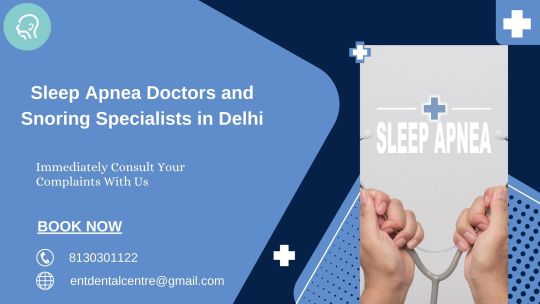
Sleep apnea and chronic snoring are common sleep disorders that can significantly impact one's quality of life and overall health. Fortunately, Delhi, India, is home to a plethora of experienced healthcare professionals specializing in the diagnosis and treatment of these conditions. In this article, we will explore the importance of seeking help from a sleep apnea doctor and a snoring specialist in Delhi.
Understanding Sleep Apnea
Sleep apnea is a sleep disorder characterized by interrupted breathing during sleep. This condition can lead to a host of health issues, including hypertension, cardiovascular disease, and daytime fatigue. The primary types of sleep apnea are obstructive sleep apnea (OSA) and central sleep apnea (CSA).
In Delhi, individuals suffering from sleep apnea can find expert care from sleep apnea doctors who are well-versed in the latest diagnostic techniques and treatment options. These specialists conduct thorough evaluations, which may include Polysomnography (sleep studies), to determine the severity of the condition.
The Role of a Sleep Apnea Doctor in Delhi
A sleep apnea doctor in Delhi plays a crucial role in diagnosing and treating sleep apnea. Here are some key responsibilities of these specialists:
Diagnosis: Sleep apnea doctors use various diagnostic tools to assess the severity and type of sleep apnea. These may include in-lab sleep studies or home-based sleep monitoring devices.
Treatment Planning: Once the diagnosis is confirmed, the doctor will work with the patient to develop a personalized treatment plan. Treatment options may include lifestyle changes, continuous positive airway pressure (CPAP) therapy, or surgical interventions.
Monitoring Progress: Ongoing monitoring and adjustments to the treatment plan are essential to ensure its effectiveness. Regular follow-up visits with a sleep apnea doctor help patients achieve optimal results.
Addressing Chronic Snoring in Delhi
Chronic snoring can disrupt not only the snorer's sleep but also the sleep of their bed partner. In many cases, snoring may be a symptom of a more severe underlying issue, such as sleep apnea. Seeking care from a snoring specialist in Delhi can help individuals find relief from this disruptive habit.
The Role of a Snoring Specialist in Delhi
A snoring specialist in Delhi is trained to evaluate and treat chronic snoring. Here's what you can expect from their services:
Assessment: The specialist will assess the causes and severity of your snoring through a detailed evaluation, which may involve an examination of your throat and airway.
Treatment Options: Depending on the findings, the snoring specialist may recommend lifestyle modifications, oral appliances, or surgical procedures to reduce or eliminate snoring.
Follow-up Care: Just like with sleep apnea, follow-up visits with a snoring specialist are essential to monitor progress and make any necessary adjustments to the treatment plan.
Conclusion
Sleep apnea and chronic snoring are more than just annoyances; they can have serious consequences for your health and well-being. In Delhi, a vibrant city known for its medical excellence, individuals have access to dedicated sleep apnea doctors and snoring specialists who can provide expert care and solutions.
If you or a loved one is struggling with sleep apnea or chronic snoring, don't hesitate to seek help from these specialized healthcare professionals in Delhi. A restful night's sleep and improved overall health could be just a visit away. Remember, addressing sleep-related issues is a vital step towards a healthier, more energized life.
#sleep apnea clinic#sleep apnea doctor in delhi#ent specialist in south delhi#sleep apnea treatment in delhi#snoring specialist delhi
0 notes
Text
Exploring the Expertise of Ear Specialists and ENT Doctors in South Delhi
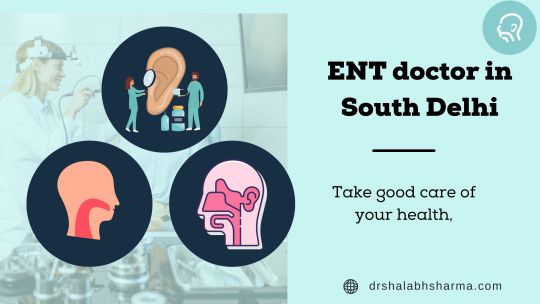
When it comes to the delicate realm of ear, nose, and throat (ENT) health, seeking the guidance of a qualified specialist is of utmost importance. Residents of South Delhi are fortunate to have access to a range of skilled professionals who specialize in diagnosing and treating conditions related to the ears, nose, and throat. In this article, we'll delve into the significance of ear specialists and ENT doctors in South Delhi, highlighting their expertise and the essential role they play in maintaining overall well-being.
The Importance of Ear Health
The ears are not just organs responsible for hearing; they also play a crucial role in maintaining balance. Any issues related to the ears can significantly impact one's quality of life. Whether it's hearing loss, ear infections, or balance disorders, these problems can cause discomfort and hinder daily activities. This is where the expertise of an ear specialist or an ENT doctor becomes invaluable.
Expert Ear Specialists in South Delhi
South Delhi boasts a wealth of medical talent, including expert ear specialists who are dedicated to addressing a wide array of ear-related concerns. These specialists, often referred to as otolaryngologists or ENT doctors, have undergone rigorous training and education to gain a deep understanding of the intricate anatomy and functioning of the ears.
An ear specialist in South Delhi is equipped to diagnose and treat various conditions, such as:
Hearing Loss: Whether it's conductive, sensor neural, or mixed hearing loss, an ear specialist can accurately diagnose the type and severity of hearing impairment and recommend appropriate interventions.
Ear Infections: From common ear infections to more complex cases like chronic otitis media, an ear specialist can provide timely and effective treatments to alleviate pain and prevent complications.
Tinnitus: If you're experiencing ringing or buzzing sounds in your ears, an ear specialist can identify the underlying causes and offer management strategies.
Balance Disorders: Disorders such as vertigo can significantly affect a person's equilibrium. An ear specialist can diagnose the cause of balance issues and offer tailored treatment plans.
Comprehensive Care from ENT Doctors
ENT doctors, often referred to as otolaryngologists, are medical professionals who specialize in diagnosing and treating conditions affecting the ears, nose, and throat. These specialists possess a broad understanding of the interconnected nature of these areas and can provide comprehensive care to address a wide range of health concerns.
In South Delhi, ENT doctors offer expertise in treating:
Nasal Issues: From chronic sinusitis to nasal deformities, ENT doctors can diagnose and treat conditions that affect breathing, smell, and overall nasal function.
Throat Conditions: Sore throats, voice disorders, and swallowing difficulties fall within the purview of ENT specialists. They can recommend appropriate interventions and therapies.
Sleep Apnea: Sleep-disordered breathing, including sleep apnea, can have serious health implications. ENT doctors can assess and offer treatment options to improve sleep quality.
Conclusion
The expertise of ear specialists in South Delhi is a valuable asset to the community's healthcare landscape. With their in-depth knowledge, specialized skills, and dedication to patient well-being, these professionals play a pivotal role in diagnosing, treating, and preventing a wide range of ear, nose, and throat conditions. By seeking the guidance of these experts, residents of South Delhi can ensure that their ear, nose, and throat health remains in capable hands. Remember, regular check-ups and timely interventions are key to maintaining optimal overall health and quality of life.
#ent doctor in south delhi#ent specialist in south delhi#best cochlear implant surgeon in delhi#best ent doctor in delhi#best ent specialist in delhi
0 notes
Text
Enhancing Hearing Abilities: Exploring Cochlear Implants in Delhi
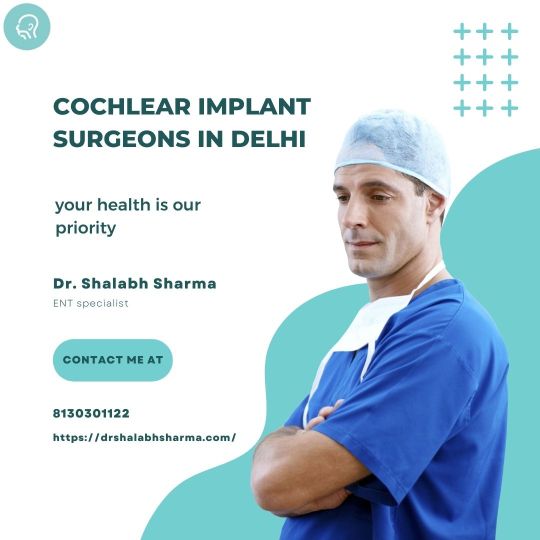
Living with hearing loss can be challenging, affecting various aspects of one's life, including communication, social interactions, and overall quality of life. Fortunately, advancements in medical technology have provided solutions such as cochlear implants to improve hearing abilities. In the bustling capital of India, Delhi, individuals seeking cochlear implants can find expert guidance from highly skilled cochlear implant surgeons. This article delves into the significance of cochlear implants and highlights the availability of top-notch cochlear implant surgeons in Delhi.
Understanding Cochlear Implants:
A cochlear implant is a small electronic device that can effectively restore hearing for individuals with severe to profound hearing loss. Unlike hearing aids, which amplify sounds, cochlear implants bypass damaged parts of the inner ear (cochlea) and directly stimulate the auditory nerve, allowing individuals to perceive sound.
The implant consists of two main components: an external part and an internal part. The external part, worn behind the ear, captures sounds and processes them into electrical signals. These signals are then transmitted to the internal part of the implant, which is surgically placed under the skin. The internal component stimulates the auditory nerve, sending signals to the brain, where they are interpreted as sound.
Cochlear Implants in Delhi:
Delhi, the vibrant capital city of India, is renowned for its excellent healthcare facilities and advanced medical expertise. Individuals seeking cochlear implants can find a wide range of options in Delhi, with specialized clinics and experienced cochlear implant surgeons offering comprehensive services.
When considering a cochlear implant in Delhi, it is crucial to consult with a qualified and experienced cochlear implant surgeon in Delhi. These professionals possess the necessary skills and expertise to evaluate a patient's hearing loss, determine their candidacy for a cochlear implant, and perform the surgical procedure with precision.
Cochlear Implant Surgeons in Delhi:
Delhi boasts a pool of highly skilled cochlear implant surgeons who are dedicated to improving the hearing abilities of their patients. These surgeons are well-versed in the latest advancements in the field of audiology and possess vast experience in performing cochlear implant surgeries.
Patients seeking the expertise of a cochlear implant surgeon in Delhi can benefit from personalized assessments, comprehensive pre- and post-operative care, and guidance throughout the rehabilitation process. The surgeons work closely with a multidisciplinary team, including audiologists and speech therapists, to ensure the best possible outcome for their patients.
In addition to their expertise, cochlear implant surgeons in Delhi are equipped with state-of-the-art facilities, advanced diagnostic tools, and access to the latest implant technologies. This enables them to provide tailored treatment plans and ensure optimal outcomes for each patient.
Conclusion:
For individuals with severe to profound hearing loss, cochlear implants can significantly improve their hearing abilities and enhance their overall quality of life. In Delhi, a city known for its advanced healthcare facilities, individuals seeking cochlear implants can find expert guidance from highly skilled cochlear implant surgeons.
By consulting with a qualified ENT surgeon in Delhi, patients can undergo a thorough evaluation, receive personalized treatment plans, and benefit from comprehensive care throughout the entire process. With the right expertise and support, cochlear implants have the potential to transform the lives of individuals with hearing loss, allowing them to reconnect with the world of sound and regain their independence.
#best ent specialist in delhi#cochlear implant surgeon in delhi#cochlear implants in delhi#cochlear implant in delhi#best ent doctor in delhi
0 notes
Text
Effective Snoring Treatment in Delhi: Seeking Help from ENT Specialists

Snoring, a common yet disruptive condition, affects millions of people worldwide, causing sleep disturbances for both the snorer and their sleep partner. The consequences of chronic snoring can range from daytime fatigue and irritability to more severe health issues. If you or your loved one is struggling with snoring, seeking timely and effective treatment is crucial to restore peaceful sleep and maintain overall well-being. In Delhi, a city brimming with medical expertise, numerous snoring specialists and ENT specialists offer comprehensive solutions to address this concern.
Understanding Snoring and its Impact:
Snoring is the result of the vibration of the soft tissues in the throat during sleep. It can be attributed to various factors, including nasal congestion, obesity, alcohol consumption, sleep position, and anatomical abnormalities such as a deviated septum or enlarged tonsils. While occasional snoring may not be a cause for concern, habitual and loud snoring often indicates an underlying issue that warrants attention.
The Role of Snoring Specialists:
In Delhi, individuals seeking effective snoring treatment can turn to snoring specialists in Delhi, who are often trained otolaryngologists or ENT specialists with expertise in diagnosing and treating sleep-related disorders. These specialists possess the knowledge and skills required to evaluate the root causes of snoring and provide personalized treatment plans accordingly.
ENT Specialists in Delhi:
ENT specialists in Delhi play a crucial role in managing snoring-related concerns. These medical professionals specialize in diagnosing and treating disorders affecting the ears, nose, throat, and related structures. When it comes to snoring, ENT specialists can offer comprehensive assessments to identify any underlying issues contributing to snoring, such as nasal blockages, tonsil enlargement, or structural abnormalities. By addressing these factors, ENT specialists can develop tailored treatment strategies to alleviate snoring and improve sleep quality.
Snoring Treatment Options:
Snoring treatment in Delhi and ENT specialists employ various treatment modalities to help individuals overcome snoring and its associated problems. The appropriate treatment plan is determined based on the severity of snoring, underlying causes, and individual patient preferences. Some common snoring treatment options include:
Lifestyle modifications: Simple lifestyle changes, such as maintaining a healthy weight, avoiding alcohol and sedatives, and sleeping in a lateral position, can significantly reduce snoring.
Continuous Positive Airway Pressure (CPAP): For individuals with sleep apnea, a condition often accompanied by snoring, a CPAP machine can be recommended. This device delivers a continuous stream of air to keep the airway open during sleep.
Oral appliances: Custom-made oral devices can be prescribed to reposition the jaw and tongue, allowing better airflow and reducing snoring.
Surgical interventions: In cases where anatomical abnormalities are the root cause of snoring, surgical procedures may be considered. These can range from minimally invasive treatments, such as radiofrequency ablation, to more complex surgeries like uvulopalatopharyngoplasty (UPPP) or nasal septoplasty.
Snoring can significantly impact one's sleep quality and overall well-being. However, with the help of snoring specialists and ENT specialists in Delhi, effective solutions are within reach. By seeking timely evaluation and treatment, individuals can address the root causes of snoring and restore peaceful nights of sleep. Remember, a good night's sleep is vital for optimal health and should not be compromised. Don't hesitate to reach out to snoring specialists or ENT specialists in Delhi to embark on a journey towards better sleep and improved quality of life.
#snoring treatment in delhi#snoring specialist delhi#sleep apnea treatment in delhi#sleep apnea doctor in delhi#sleep specialist in delhi#ent specialist in delhi#best ent specialist in delhi
0 notes
Text
Best ENT Doctor In India and How They Can One Help You?
Yes, India has become a popular destination for medical tourism due to its advanced healthcare facilities, highly qualified doctors and surgeons, and cost-effective treatments. The country has a vast network of hospitals and clinics that offer a wide range of medical treatments, including surgeries, cancer treatments, organ transplants, and cosmetic surgeries, among others.
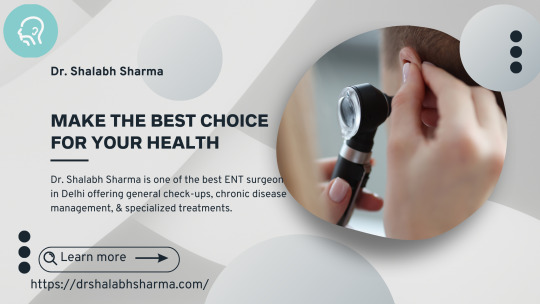
India's medical tourism industry has witnessed significant growth over the years, with patients from all over the world visiting the country for various medical procedures. The cost of medical treatments in India is much lower compared to other developed countries, making it an affordable option for patients seeking quality healthcare.
When it comes to your health, you want nothing but the best. This is especially true when it comes to surgery, where you want to ensure that the surgeon you choose is the best in their field. If you are in Delhi and are in need of surgery related to your ears, nose, or throat, then you are in luck. Delhi is home to some of the best ENT surgeons in the country, and finding the right one for you is just a matter of knowing where to look.
One of the most common ENT surgeries is related to sinus issues. Sinusitis is a common condition that affects millions of people every year. Symptoms include congestion, headaches, and facial pain. If you are suffering from sinusitis, then finding the right surgeon is crucial. The best sinus surgeon in Delhi will have years of experience and a proven track record of successful surgeries.
Dr. Shalabh Sharma is one of the most renowned sleep specialist in Delhi. He has over 33 years of experience and has performed countless successful surgeries. He is known for his personalized approach to each patient and his dedication to providing the highest level of care. Dr. Sharma uses the latest technology and techniques to ensure the best possible outcome for his patients.
Another common ENT surgery is related to the ears. Issues like hearing loss, ear infections, and tinnitus can have a significant impact on your quality of life. If you are in need of ear surgery, then you want to ensure that you choose the best ENT surgeon in Delhi.
When it comes to finding the best ENT specialist in Delhi, it is important to do your research. Look for surgeons who have extensive experience, a proven track record of success, and a commitment to using the latest technology and techniques. You should also consider factors like location and cost, as these can impact your overall experience.
In conclusion, if you are in need of ENT surgery in Delhi, then you are in luck. The city is home to some of the best surgeons in the country, and finding the right one for you is just a matter of knowing where to look. Whether you need sinus surgery or ear surgery, there is a surgeon out there who can help you get back to living your best life.
#best ent specialist in delhi#best ent doctor in delhi#sleep apnea clinic#sleep specialist in delhi#best ent surgeon in delhi
0 notes
Text
Factors of Nasal Polyps And how Nasal Polyps Develop
Nasal polyps are soft, painless, noncancerous growths that develop in the lining of the nasal passages and sinuses. They are typically teardrop-shaped or round and range in size from a few millimeters to several centimeters in diameter.
Nasal polyps can occur in one or both nostrils and may grow large enough to obstruct the nasal passages, making it difficult to breathe through the nose. They can also cause a runny or stuffy nose, postnasal drip, loss of smell or taste, and sinus pressure or pain.
The exact cause of nasal polyps is not clear, but they are thought to be associated with chronic inflammation of the nasal and sinus tissues, allergies, asthma, infections, and certain medications. Treatment for nasal polyps may include medications such as nasal corticosteroids, antibiotics, or antihistamines, and in some cases, surgery may be necessary to remove the polyps.
Dr. Shalabh Sharma is the best ENT doctor in vasant vihar offering general check- ups, habitual complaint operation, & technical treatments. He has been rehearsing as an ENT surgeon since the once 25 times. Bringing with him times of clinical experience and surgical moxie, his clinic offers state of the art installations in a warm and relaxed terrain.
Factors contribute to polyp formation
The exact causes of nasal polyps are not fully understood, but there are several factors that are believed to contribute to their formation. These include:
Chronic inflammation: Nasal polyps are often associated with chronic inflammation of the nasal and sinus tissues. This inflammation can be caused by allergies, infections, or other irritants.
Allergies: People with allergies are more likely to develop nasal polyps. Allergic reactions can cause inflammation in the nasal passages and sinuses, which can lead to the formation of polyps.
Asthma: People with asthma are also at an increased risk of developing nasal polyps. The chronic inflammation associated with asthma can affect the nasal passages and sinuses, leading to the formation of polyps.
Genetic factors: There may be a genetic component to nasal polyp formation. Some studies suggest that people with a family history of nasal polyps may be more likely to develop them.
Medications: Certain medications, such as nonsteroidal anti-inflammatory drugs (NSAIDs) and aspirin, can trigger the formation of nasal polyps in some people.
Other medical conditions: People with certain medical conditions, such as cystic fibrosis, Churg-Strauss syndrome, or Kartagener's syndrome, may be more likely to develop nasal polyps.
FESS the best surgical treatment
Functional endoscopic sinus surgery (FESS) is a common surgical treatment for nasal polyps and other sinus-related conditions. FESS is considered the best surgical treatment for several reasons:
Minimally invasive: FESS is a minimally invasive surgical procedure that is performed using an endoscope. This means that the surgeon can access the nasal and sinus cavities through the nostrils, without making any external incisions.
Precise: FESS allows the surgeon to visualize the nasal and sinus cavities in great detail, using a high-definition camera attached to the endoscope. This enables them to remove polyps and other tissues with precision, while minimizing damage to surrounding tissues.
Effective: FESS has been shown to be an effective treatment for nasal polyps and other sinus-related conditions. The procedure can help to improve symptoms such as nasal congestion, difficulty breathing, and reduced sense of smell.
Quick recovery time: Because FESS is a minimally invasive procedure, it typically requires less recovery time than traditional open surgery. Most patients are able to return to normal activities within a few days to a week after the procedure.
Low complication rate: FESS has a low complication rate, and serious complications are rare. However, as with any surgical procedure, there is a small risk of bleeding, infection, or other complications.
Can the polyps occur again?
Yes, nasal polyps can recur after treatment, including after surgical removal. Recurrence rates vary depending on the individual and the specific treatment used. Some studies have found that up to 50% of people may experience polyp recurrence after surgery.
However, the risk of recurrence can be reduced by taking steps to address the underlying causes of the polyps, such as managing allergy, controlling asthma, treating infections. Regular use of nasal corticosteroids after surgery may also help prevent polyp regrowth.
As we mentioned, follow-up appointments with the surgeon are important after treatment to monitor for polyp recurrence and adjust the treatment plan if necessary. In some cases, additional treatments such as additional surgery or alternative medications may be needed if polyps do recur.
#best allergy treatment in delhi#best allergy treatment in vasant vihar#best ent specialist in delhi#best sinus surgeon in delhi
0 notes
Text
How Is Hearing Loss Diagnosed?
Hearing loss can be diagnosed within a few days of birth. Tests such as BERA, ASSR, Impedance audiometry, OAE, and BOA (behavioral observation audiometry) can all be carried out and a complete diagnosis made. These tests will confirm the presence of any hearing loss and tell us the degree/severity of hearing loss also. Most of the time the exact site of damage can also be ascertained.
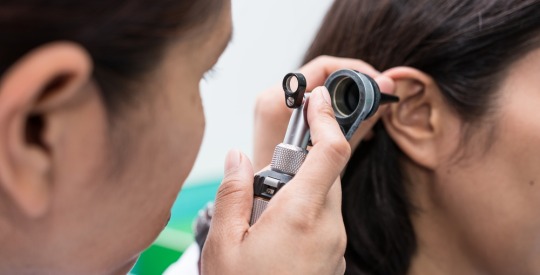
What is the impact of hearing loss on a child?
Reduced listening skills
Lifelong language deficits
Lifelong communication deficits
Poor basic reading skills
Poor ability to learn to write
Compromised academic career
Behaviour, self-esteem, mental health & social skills are also affected.
Is it important to diagnose hearing loss early?
Early diagnosis is very important in the management of hearing loss. This is why most developed countries have Universal Hearing Screening Programs in which all newborn babies are tested for hearing loss immediately after birth.
A child’s brain is very plastic and can learn new tasks easily, such as hearing. As the child hears, new pathways develop in the brain and the child learns to understand speech and language. With time, the child learns to speak and express himself. If the diagnosis is delayed, then the child starts hearing sounds late in life. By the age of 6-7 years, the child’s brain has lost its plasticity. That means that the child will find it difficult to learn new tasks at this age.
This is the reason that children who are diagnosed early and who receive either hearing aids or cochlear implants at an early age consult the best ENT doctor in south Delhi (depending on the severity of hearing loss) and tend to do very well compared to older children.
Hearing aids are beneficial up to what degree of hearing loss?
Hearing aids are beneficial in children and adults who have a hearing loss between 25-70 decibels (mild to a moderately severe hearing loss). Anyone with a hearing loss of more than 70 decibels needs to be fitted with a cochlear implant.
How does a hearing aid work?
Hearing aids are simply amplifiers of sound. Some are very sophisticated in terms of technology, but they all have a limitation in that they do not provide benefits to someone with a hearing loss greater than 70 dB (decibels).
What is a cochlear implant and how does it work?
A cochlear implant is an electronic device that provides hearing sensation to those with severe to profound hearing loss. This device consists of two parts. One is the internal part that is placed under the skin behind the ear by a surgical procedure. The other part is the external part called the processor that is used behind the ear like a hearing aid. This processor collects the sound with the help of microphones and digitises it into FM radio waves. These waves pass across the skin to the internal implant where they are converted into electrical impulses. These impulses then reach the cochlea thru the electrode and they stimulate the hearing nerve fibres directly. Hence, the implantee hears a sound.
How successful are cochlear implants?
Cochlear implants are a modern medical miracle. They have helped lakhs of children and adults hear the sound, and learn speech and language. Since the first implant in a child in 1985, they have helped children go to normal schools and colleges and develop near-normal hearing, speech, and language. These children are now socially useful and productive members of society.
What is the process to get a cochlear implant?
Once the hearing (audiological) tests have confirmed that there is severe hearing loss, the decision is made to implant the child. A CT and MRI scan of the inner ear and hearing nerves is conducted to confirm that the anatomy of the cochlea is grossly normal and that the patient can be implanted. Then some basic blood and urine tests are carried out. After this, cochlear implant surgery can be performed by the best cochlear implant surgeon in Delhi. This procedure usually takes between 1-2 hours.
How early can a child be implanted?
My youngest child is 8 months old, but children as young as 6 months are being routinely implanted in some centres in the world.
Can an adult be implanted?
Cochlear implants are very effective in adults who lose their hearing at any stage in their lives. This may be due to age-related hearing loss, accidents, infections, and many other reasons. My oldest patient is over 87 years old.
How common is severe hearing loss in India?
An estimated 50,000 babies are born in India every year with severe to profound hearing loss. Most of them need a cochlear implant. However, at the moment, only an estimated 1,500 children in India under the age of 4 have a cochlear implant!
Original Source: How Is Hearing Loss Diagnosed?
#ent doctor in south delhi#best cochlear implant surgeon in delhi#cochlear implant surgeon in delhi#best ent doctor in south delhi#ear specialist in south delhi#ear doctor in south delhi
1 note
·
View note